BS Reporter in New Delhi
Speaking to Business Standard about the Land Acquisition Bill recently cleared by the Cabinet, Union Rural Development Minister Jairam Ramesh said though the farmers' protests in Uttar Pradesh provided the impetus, the Bill was as much a political response to a poll problem as a legal response to a social issue.
Edited excerpts:
What prompted the Bill?
One of the most important motivations was the public protests that surrounded land acquisition in Uttar Pradesh and the political context was Rahul Gandhi's padyatra in the state.
So, it is useful to compare the UP land policy and this Bill.
. . .
Land Bill: Here's how Jairam Ramesh explains it
Are you not making it all political when the issue is not so?
It is a political attitude, as I am a political animal. It is as much a political response to a poll problem as a legal response to a social issue. A bill for land acquisition is a political action.
Was there any heated debate in the Cabinet before the draft was finally approved?
There was no heated debate.
There was concern on two issues, that the cost of land would go up substantially and that public-private partnership projects would be impacted.
Some changes were made in response and to everyone's satisfaction.
. . .
Land Bill: Here's how Jairam Ramesh explains it
Image: Rahul Gandhi with his mother Sonia Gandhi.Photographs: B Mathur/Reuters
What were Rahul Gandhi's contributions to the Bill?
He was the strongest advocate of a single Bill for acquisition, compensation and resettlement.
He felt we should have an integrated approach.
He supported the idea of compensation for land losers as well as livelihood losers. He insisted that in tribal areas, where bulk of the acquisition would take place, it should be in consonance with existing laws for Schedule 5 and 6.
He said if a tribal family was relocated to a non-schedule 5 area, it should continue to enjoy constitutional protection.
He was also a strong backer of the retrospective effect after his padyatra.
He felt that we must address some of the ongoing disputes with the Bill.
It would be fair to say that without his backing the Bill in this form would not have happened.
. . .
Land Bill: Here's how Jairam Ramesh explains it
Image: Protestors of Posco project in Orissa.Would it help the Congress in UP?
That depends on the Congress in UP. But it would definitely be an important political issue.
What is the biggest change this Bill seeks to bring?
You have to seek consent of 80 per cent of the people affected by the project before you acquire any land.
Imagine even for an airport 80:20 applies.
Both the government and private parties have to pay at least the minimum compensation prescribed with just some exceptions.
. . .
Land Bill: Here's how Jairam Ramesh explains it
Image: Stick-wielding protesters, mostly women, demonstrate as they demand higher compensation for land.Photographs: Brijesh Singh/Reuters
Will the new law apply in Uttar Pradesh?
UP will have to comply.
Would 80 per cent of gram sabha have to give their consent?
No that is only in the case of schedule 5 and 6 areas. In other places, only 80 per cent of project-affected families, including landless dependents have to agree.
Who would identify PAFs?
This would be done during the social impact assessment which would be done by the authorities concerned.
. . .
Land Bill: Here's how Jairam Ramesh explains it
Image: Farmers attend a protest in New Delhi.Photographs: Adnan Abidi/Reuters BS Reporter in New Delhi
Land acquisition Bill suggests better redressal
The process of land acquisition becoming more sensitive to the grievances of the owner earned a better prospect today as a Bill was tabled in Parliament on Wednesday, setting a base level for compensation to even its dependents.
The Land Acquisition Rehabilitation and Resettlement Bill, now pending passage in the Lok Sabha, suggests that industry is free to acquire land in cases where the matter pertains to below 50 acres in urban areas and 100 acres in rural areas, but that it would require mutual negotiation with the farmers/landowners to arrive at a price.
. . .
Land Bill: Here's how Jairam Ramesh explains it
Image: Farmers work on their flooded vegetable field at Tihera village near Agra.Photographs: Brijesh Singh/Reuters
In cases above 50 and 100 acres, industry will be subject to rigorous compensation levels.
States are free to offer more compensation; but they cannot go below the level proposed under the Bill.
Striking a balance between those who need land -- like the state itself, industry and other private entities -- and those who are ready to sell it, the bill provides for compensation of land owners at the rate of four times the market value of a given piece of land whether it is for public or private purpose in rural areas and at the rate of two times in urban areas. In the original draft bill, this was six times in rural areas.
Thus the concerns of those seeking to buy land have been kept in mind.
. . .
Land Bill: Here's how Jairam Ramesh explains it
Similarly, if land was originally not used by industry for over five years, it was to revert to the owner.
This period -- on recognising fiscal and other difficulties -- has now been increased to 10 years.
What's more, the land now returning to the owner goes to a state land bank proposed in the Bill.
The Bill allows acquisition of up to five per cent of agricultural land -- but as a demonstrably last resort, with the proviso that the industry will have to develop wastelands in lieu.
. . .
Land Bill: Here's how Jairam Ramesh explains it
Image: A farmer with sugarcane in Bagphat, Uttar Pradesh.Photographs: Reinhard Krause/Reuters
It, however, does not provide for returning this re-developed land to the cultivator whose irrigated land was acquired.
Nor does it explain who would then cultivate this new land.
In the past, industry, if on finding it hard to acquire land, would ask the government to do so on its behalf.
This led to discussion on the ratio: the government, it was suggested, could acquire 30 or 20 per cent if industry had already acquired the rest.
The Bill makes no such distinction.
. . .
Land Bill: Here's how Jairam Ramesh explains it
Image: Uttar Pradesh Chief Minister Mayawati.Photographs: Reuters
The government can, for instance, buy all the land and give it to industry; or industry is free to acquire all the land on its own or only a part of it.
But compensation and R&R will apply in all cases, no matter which agency acquires the land.
If industry has acquired land on its own at lower rates, and requests the government to acquire more land for reasons of contiguity, the rates of compensation can not be different for the two parcels of land.
The private parties will be forced the pay the higher rate of compensation even for the land it had bought on its own.
. . .
Land Bill: Here's how Jairam Ramesh explains it
Image: A passenger bus is set on fire during a protest by farmers demanding higher compensation for land.Photographs: Brijesh Singh/Reuters
The people who lose their land and livelihood get the same Resettlement and Rehabilitation benefits.
In the earlier bill, those who lost livelihood got a better package than those who merely lost land.
There is an elaborate package for R&R and this provides wider choice.
The Bill also sets up a new institutional structure to enforce the various provisions.
At the Central level it provides for a national monitoring committee which would oversee all projects.
. . .
Land Bill: Here's how Jairam Ramesh explains it
Image: Parliament House.At the state level, it provides for the State LA and RR Authority to resolve disputes like a civil court, a committee under the chief secretary to determine whether projects are for public purpose, and an RR commissioner to administer LA and RR in the State.
At the project level it provides for the District Collector to do overall coordination, and implementation, while an RR administrator would oversee administration of the RR and an RR committee (of elected representatives, civil societies and line agencies) would monitor the RR.
. . .
Land Bill: Here's how Jairam Ramesh explains it
Image: Protests against land acquisition.Photographs: Courtesy, landcoalition.org.
All land disputes are to be settled only by the State LA and RR Authority and its presiding officer who would be a district judge.
No other civil courts except high courts and Supreme Courts would be allowed to deal with disputes dealing with land acquisition and rehabilitation as per the Bill.
. . .
Land Bill: Here's how Jairam Ramesh explains it
The Bill has many provisions as safeguards against indiscriminate acquisition like the social impact assessment, which is to be done by a committee delegated by the chief secretary, a provision for including details of the R&R Administrator in the draft notification of land acquisition of a project.
Similarly the draft declaration of the project would include summary of the R&R package.
While land would be lost if not used in ten years, every transfer of land would mean payment of 20 per cent of the appreciated land value to the original owner.


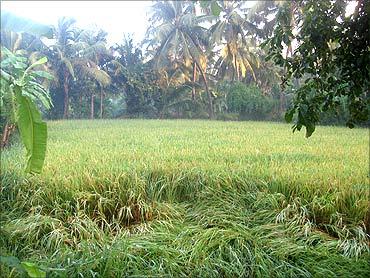
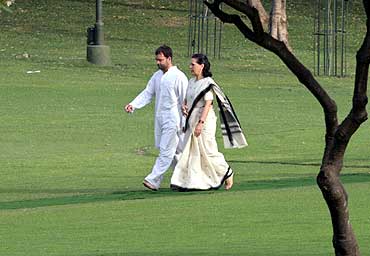
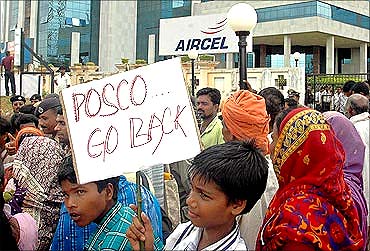
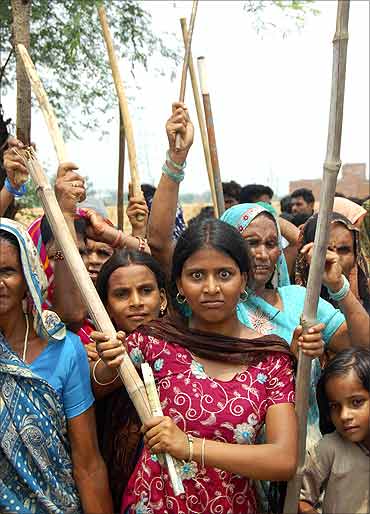




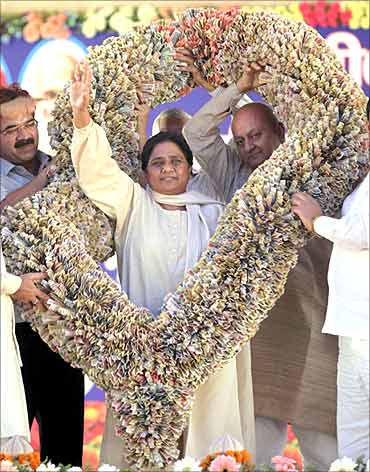
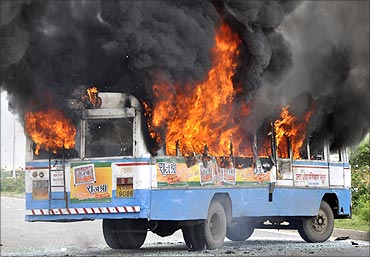
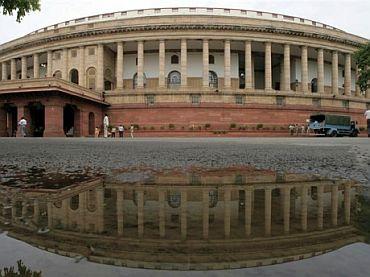



article